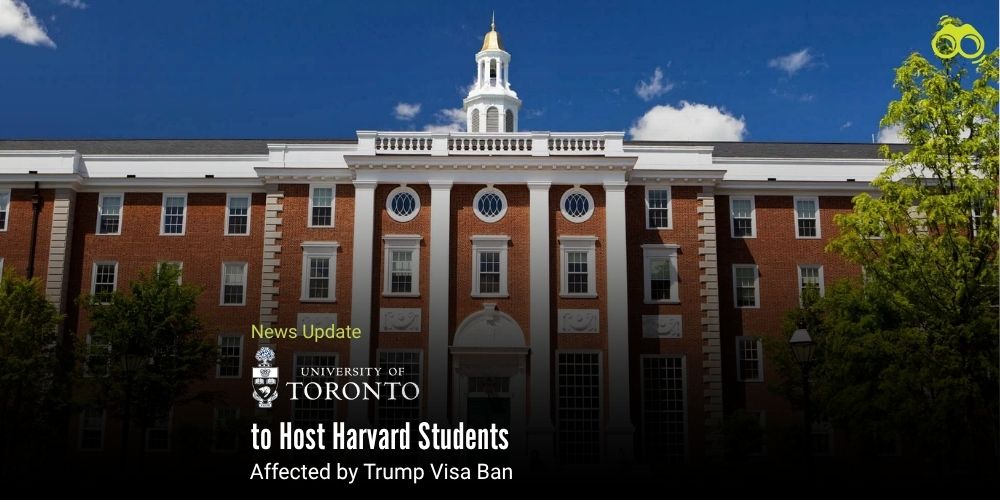University of Toronto Offers Academic Shelter to Harvard Students Blocked by U.S. Visa Hurdles
Harvard Partners with Toronto to Ensure Academic Continuity for International Students
In a decisive move to address growing political uncertainty and tightening U.S. visa regulations, Harvard University and the University of Toronto have reportedly introduced a contingency plan aimed at protecting the academic continuity of international students. The initiative would allow eligible Harvard students to complete their studies in Canada if visa barriers prevent entry into the United States.
The collaboration involves the Harvard Kennedy School of Government and the University of Toronto’s Munk School of Global Affairs and Public Policy. It is seen as a response to the increasingly volatile political landscape affecting higher education during Donald Trump’s second presidential term. Jeremy Weinstein, Dean of the Harvard Kennedy School, reportedly informed students in a letter that the plan is intended to ease concerns among those facing visa or travel difficulties. He added that a formal programme would only be implemented if there is sufficient demand from students unable to attend classes in the U.S. He also expressed appreciation to the Munk School and other partners for their support in upholding Harvard’s standard of educational excellence.
The move follows Harvard’s legal dispute with the Trump administration, in which the university alleges that the Department of Homeland Security improperly revoked its authority to enrol international students. With nearly a quarter of its student body comprising international students, Harvard views this cohort as vital both academically and financially. The university has already secured two preliminary injunctions against the DHS, potentially enabling affected students to obtain entry visas.
Janice Stein, founding director of the Munk School, reportedly described the situation as “exceptional,” highlighting the broader challenges facing global higher education institutions. In light of ongoing visa uncertainties, the Munk School has expressed its readiness to accommodate Harvard Kennedy School students unable to return to Cambridge, Massachusetts. The school aims to provide a shared academic and co-curricular experience for students from both universities, ensuring educational continuity amid cross-border restrictions.
Additionally, the institutions have launched a broader initiative titled HKS Global, which will offer both online and in-person components to provide flexibility for affected students. Harvard students participating in the University of Toronto programme will still be required to obtain Canadian study permits and will be enrolled as full-time, non-degree students at the Munk School. The initiative is open only to students who have completed at least one year of study in the United States.
Although Canada has recently introduced caps on international student intake and reduced visa approvals, the University of Toronto has clarified that this arrangement with Harvard will not affect available spaces in academic programmes or university housing for its students. Ultimately, the partnership serves as a pragmatic solution that prioritises academic access and continuity in an increasingly unpredictable global climate.
Editor’s Note:
U.S. immigration policy increasingly impacts international education, with stricter visa rules, unpredictable shifts, and delays, especially under administrations like Donald Trump’s, creating uncertainty. This led to a 40%+ drop in new international student enrollment between 2016-2020, per IIE data, largely due to visa/travel restrictions. For universities like Harvard (25% international students), this threatens diversity, financial stability, and academic vitality. The collaboration between Harvard University and the University of Toronto offers a strategic solution to student mobility challenges. This framework enables students denied U.S. entry to continue their education in Canada, prioritising continuity and student welfare. Focused on the Harvard Kennedy School and the Munk School, it exemplifies institutional agility and global partnership. Canada's stable international education policies, evidenced by over 500,000 study permits issued in 2023, provide a more predictable pathway for international students than the U.S., despite recent intake management measures.
Skoobuzz contends that the future of higher education lies in international collaboration, policy adaptability, and the shared responsibility of academic institutions to safeguard global access to learning. Harvard and Toronto’s partnership sets a precedent for how universities can act swiftly to protect students from the consequences of geopolitics, without compromising on the quality of education.














0 Comments (Please Login To Continue)